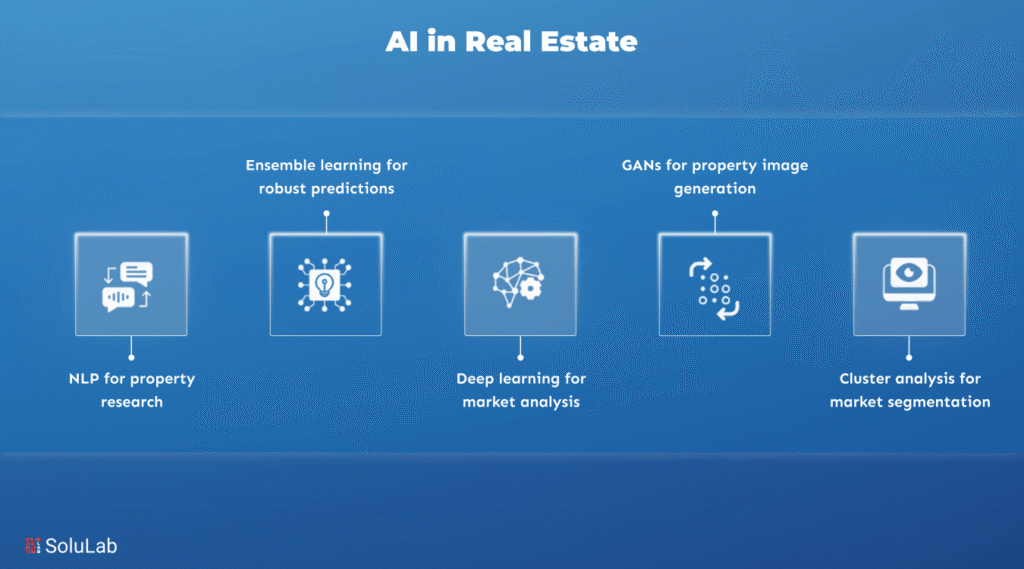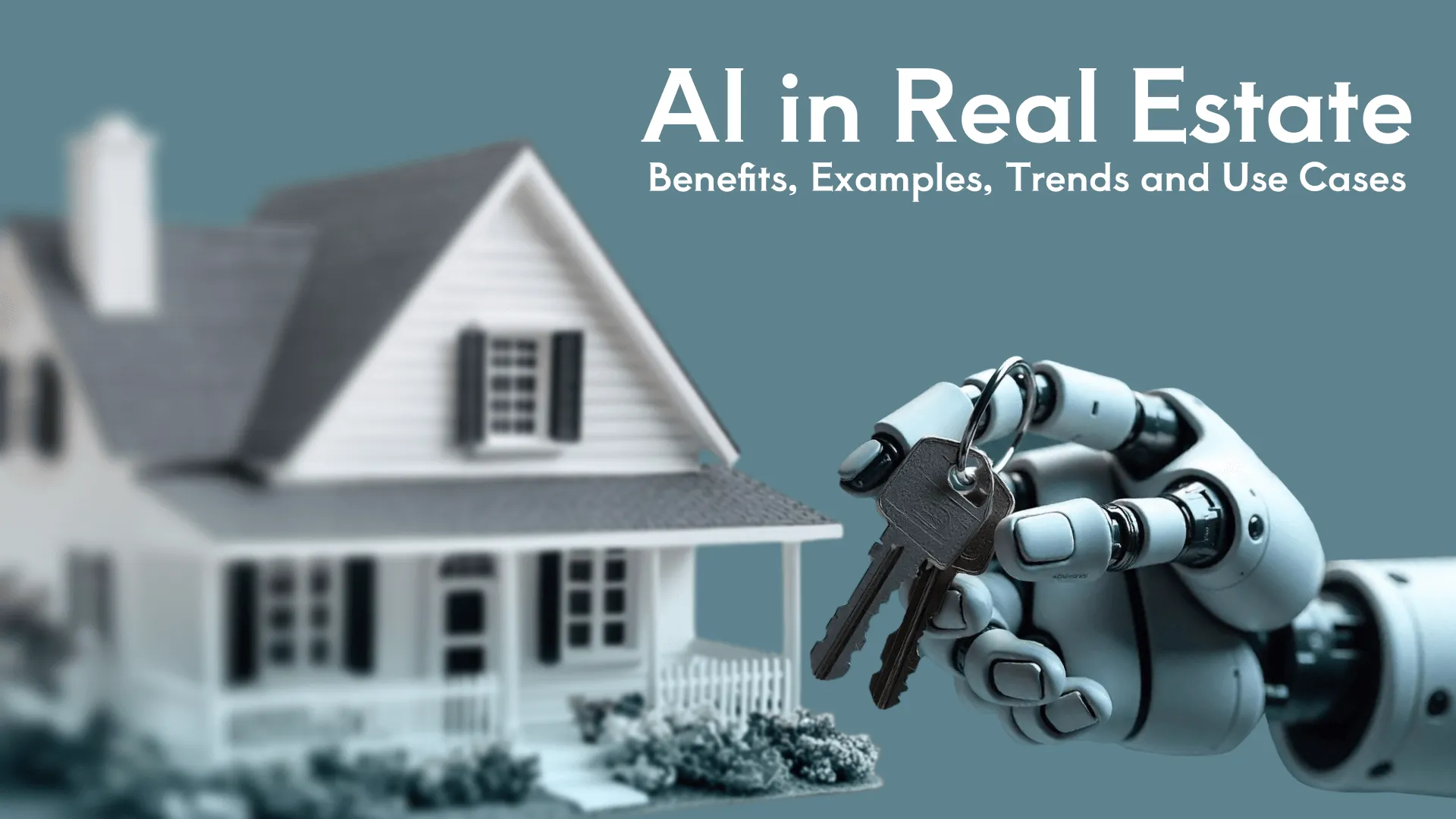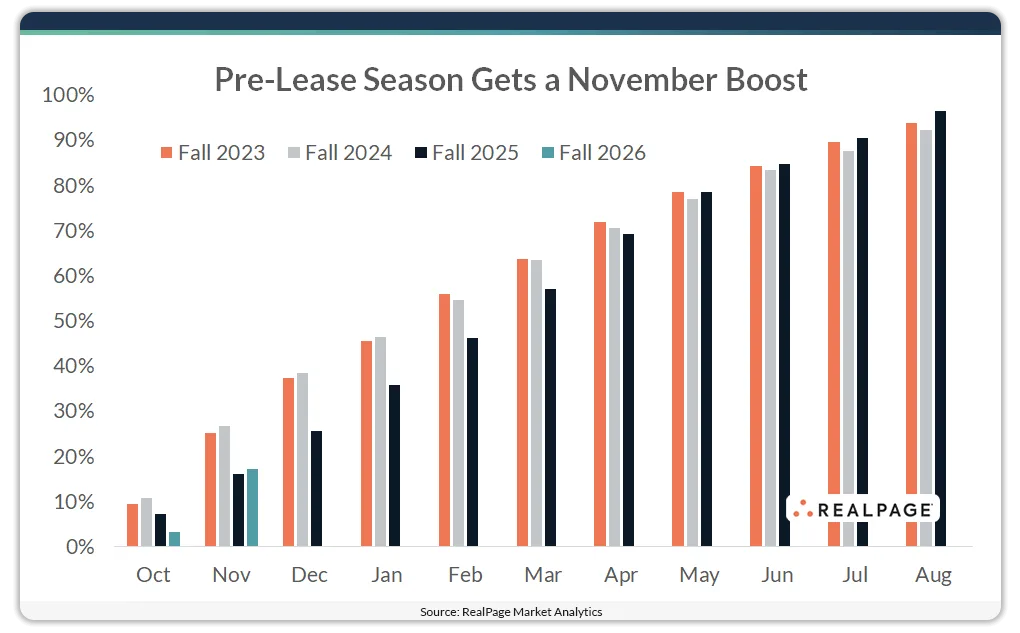Discover how AI in real estate Kenya is revolutionizing property valuation, sales, architecture, and development. Learn about key proptech trends, benefits, and challenges for investors and developers in 2025.
Introduction — Understanding AI in Real Estate Kenya
Artificial Intelligence (AI) is transforming Kenya’s real estate sector by automating property valuation, enhancing decision-making, and improving customer experiences. From predictive pricing to smart architectural design, AI tools are driving innovation and efficiency across the industry. As more property stakeholders adopt proptech in Kenya, the market is becoming data-driven, transparent, and profitable.
Developers are using AI to optimise budgets, while agents rely on it for predictive marketing and lead generation. This marks a major shift from traditional property management to intelligent, automated systems designed to meet modern real estate demands.

Related post: The Interest Rates and Real Estate in Kenya: Navigating Mortgage Financing in 2025
The Rise of Proptech and Artificial Intelligence in Kenya
Proptech—short for property technology—is reshaping how real estate businesses operate. It combines AI, data analytics, and automation to enhance property buying, selling, and management processes. In Kenya, platforms like BuyRentKenya, Hauzisha, and Knight Frank are integrating AI to improve property recommendations and streamline client interactions.
AI tools analyse user preferences, location data, and financial history to match buyers with suitable listings. The personalised approach is making property transactions faster, more transparent, and reliable. The ongoing digital transformation is setting the stage for a more connected and efficient real estate ecosystem in Kenya.
How AI is Used in Property Valuation and Market Prediction
AI in real estate in Kenya is revolutionising property valuation by increasing accuracy and speed. Machine learning models process large datasets from property sales neighbourhood data, and infrastructure developments to predict fair market values. This automation eliminates human bias and ensures consistent results across different property types.
Predictive Valuation Tools
AI-driven valuation systems use advanced algorithms to evaluate property worth by analysing location, amenities, and comparable sales. These systems can adjust for inflation, local trends, and buildinconditionson, producing highly precise results. For investors, this ensures fair pricing and reduces the risks of overpaying. Over time, predictive AI tools also learn from new data, making each subsequent valuation smarter and more accurate.
Real Estate Market Forecasting
Forecasting tools powered by AI study economic indicators, migration trends, and infrastructure projects to predict where property values will rise. Analysing years of market data, these tools give developers and investors a competitive edge when choosing investment locations. The insights help guide land acquisition, timing of sales, and project planning decisions. In Kenya, such technology is especially useful for spotting emerging growth areas before the market peaks.
Related post: How to Finance a Real Estate Project in Kenya
AI in Architecture and Smart Building Design
AI is bringing innovation to Kenya’s architectural design by automating complex tasks and promoting energy-efficient planning. Architects are now leveraging AI-powered design tools to model structural options, optimise space, and simulate environmental performance. This not only enhances creativity but also helps developers reduce design errors and costs.
Generative Design Systems
Generative AI allows architects to input project constraints—such as budget, plot size, and sustainability goals—and instantly receive multiple design options. The system evaluates thousands of potential layouts, helping designers choose the most functional and cost-effective one. This reduces time spent on revisions and enhances the quality of architectural output. In Kenya, where urban spaces are becoming denser, such AI tools help create more livable and eco-friendly buildings.
Smart Building Automation
AI extends beyond design into building management. Smart systems can monitor and adjust lighting, temperature, and energy consumption in real time, improving comfort and sustainability. Over time, these systems learn occupant behaviour and optimise building performance accordingly. Developers benefit from reduced operational costs and higher tenant satisfaction, making AI-driven buildings a preferred choice for modern homeowners.

Improving Real Estate Marketing and Sales through AI
AI is reshaping property marketing in Kenya by offering data-backed insights and personalisation. Real estate agents now use AI platforms to segment leads, predict buying intent, and tailor property recommendations based on user behaviour. This targeted approach improves conversion rates and reduces wasted advertising spend.
AI Chatbots and Virtual Assistants
AI-powered chatbots handle thousands of customer inquiries simultaneously, providing instant responses and guiding users through listings. They can answer questions, book viewings, and even collect customer preferences for better targeting. By integrating chatbots on websites and WhatsApp, Kenyan agents are improving communication efficiency and client satisfaction. Virtual assistants are also helping automate scheduling and follow-ups, freeing up time for agents to focus on negotiations.
Predictive Lead Scoring
Machine learning algorithms evaluate user behaviour—such as page views, search filters, and engagement—to predict which leads are most likely to convert. This allows sales teams to focus on serious buyers and close deals faster. Over time, these systems refine their models to deliver even higher accuracy. The result is a smarter, data-driven marketing process that aligns property listings with actual buyer demand.
Related post: Why Invest in Kenyan Real Estate Today
Benefits of Artificial Intelligence in Kenya’s Real Estate Sector
The benefits of AI in real estate in Kenya extend across multiple areas—from cost efficiency to customer satisfaction. AI helps property professionals make informed decisions faster, automate manual work, and improve data accuracy.
Faster Decision-Making
AI tools enable quick analysis of massive datasets, helping investors assess risk and return within minutes. This reduces delays in project approvals and financing decisions. It also provides instant updates on market trends, allowing stakeholders to act promptly and gain a competitive edge.
Reduced Human Error
Automatises the risk of mistakes in valuations, contracts, and property listings. AI ensures data accuracy by cross-verifying entries and detecting inconsistencies. This reliability enhances investor confidence and improves industry credibility, especially in high-value transactions.
Cost Optimization
Through AI forecasting, developers can plan construction budgets with precision, cutting down unnecessary expenses. Predictive analytics also identifies areas of wastage and recommends cost-effective alternatives. In Kenya’s price-sensitive housing market, this advantage translates directly into higher profit margins and better resource allocation.

Challenges of Adopting AI and Proptech in Kenya
Despite the promise of AI, Kenya’s real estate industry faces challenges in implementing it fully. Issues like cost, data quality, and regulatory uncertainty slow adoption among smaller firms.
High Implementation Costs
AI systems require advanced hardware, skilled professionals, and ongoing maintenance—all of which can be costly. Small real estate firms and independent agents often find it difficult to justify these expenses without immediate returns. However, cloud-based AI tools are making gradual adoption more affordable.
Data Availability and Accuracy
AI thrives on accurate, updated data. In Kenya, fragmented land records and incomplete listings can hinder AI’s effectiveness. Without consistent data inputs, models may produce less reliable results, especially in rural or underdeveloped markets. Improving data transparency will be key to unlocking AI’s full potential in the sector.
Legal and Ethical Concerns
Concerns about data privacy, misuse of customer information, and algorithmic bias are rising. Real estate players must ensure compliance with Kenya’s Data Protection Act while using AI responsibly. Developing clear ethical frameworks will help maintain public trust in AI-driven systems.
Government Role and Regulatory Support
The Kenyan government plays a vital role in encouraging AI and proptech adoption. Through digital land systems and national AI policies, it is laying the groundwork for a transparent, tech-driven property market.
Digital Land Systems
Platforms like Ardhisasa have made land ownership verification faster and more transparent. AI can build on this foundation, analysing land data for fraud detection and planning efficiency. These systems reduce disputes and make transactions smoother for both investors and buyers.
AI Policy Frameworks
Kenya’s national AI strategy aims to foster innovation in all sectors, including real estate. With the right regulations and incentives, developers will be encouraged to use AI tools responsibly. These frameworks also ensure that technological progress aligns with ethical and societal goals.

AI Startups and Proptech Innovators in Kenya
Kenya’s tech startup scene is vibrant, with several companies pioneering AI solutions for real estate. Their innovations are improving property management, valuation, and customer engagement.
Examples of Kenyan Proptech Startups
Companies like NikoHapa, Data Integrated, and VAAL Real Estate have adopted AI for property analytics, lead generation, and price forecasting. These startups are bridging the gap between traditional real estate and modern technology. By leveraging AI, they are creating more efficient and transparent property ecosystems.
Collaboration with Developers and Agents
AI startups are partnering with construction firms and real estate agents to provide customised data-driven tools. These collaborations enhance sales performance, reduce fraud, and improve project timelines. As these partnerships grow, Kenya’s real estate market will become more innovative and investor-friendly.
Future of AI in Real Estate Kenya
AI’s role in the future of Kenya’s real estate market will only grow stronger. As digital infrastructure improves, AI will become a standard tool in design, sales, and property management.
Predictive Development Planning
Future AI systems will simulate urban expansion to guide zoning and infrastructure planning. Developers will be able to model city growth patterns and identify prime investment zones before construction even begins. This foresight can drastically improve resource allocation and reduce environmental impact.
Integration with Fintech
AI and fintech integration will simplify mortgage processing, automate credit scoring, and reduce loan approval times. Homebuyers will access financing options tailored to their income and purchase history. This seamless connection between real estate and digital finance will boost property ownership across Kenya.
How to Implement AI Tools in Your Real Estate Business
Adopting AI may seem complex, but Kenyan real estate businesses can start small and scale gradually.
Choose the Right AI Platform
Begin by identifying areas where automation will have the greatest impact—such as marketing, valuation, or customer management. Choose affordable tools that integrate easily with your existing systems. Once you see measurable ROI, expand into more advanced applications like predictive analytics.
Train Your Team
Employee training is essential for AI adoption. Staff should understand how to use AI platforms effectively and ethically handle data. Building internal capacity ensures that your business can sustain innovation long-term and remain competitive in a rapidly changing market.
Conclusion
AI in real estate Kenya is not just the future—it’s already transforming how the property market functions. From smarter valuations to data-driven marketing and sustainable design, AI is helping stakeholders achieve efficiency, transparency, and profitability. Those who embrace this technology now will lead the next era of real estate innovation in Kenya.
Related post: House Designs in Kenya and the Cost.
Frequently Asked Questions (FAQs)
- What is AI in real estate in Kenya?
AI in real estate Kenya refers to the use of artificial intelligence technologies—like machine learning, automation, and data analytics—to improve how properties are valued, marketed, and managed. It enhances accuracy, speeds up transactions, and provides data-driven insights for better decision-making.
- How does artificial intelligence help in property valuation?
Analyses large datasets from previous sales, locations, and infrastructure to determine a property’s fair market value. This approach eliminates bias, speeds up the valuation process, and delivers more accurate pricing compared to traditional methods.
- What is the role of proptech in Kenya’s real estate market?
Proptech combines technology and property services to simplify transactions, improve customer experience, and enhance market transparency. It supports online property searches, digital payments, and AI-driven recommendations for buyers and investors.
- How can AI improve architectural design and planning?
AI assists architects by generating multiple design options based on constraints such as budget, land size, and environmental goals. It helps optimise space, improve energy efficiency, and create more sustainable structures for urban living.
- What are the main challenges of using AI in real estate?
Key challenges include high setup costs, limited access to clean data, and regulatory uncertainties. Ethical concerns like data privacy and algorithmic bias also pose obstacles that require proper frameworks to manage.
- Are there Kenyan companies already using AI in real estate?
Yes, companies like BuyRentKenya, VAAL Real Estate, and Data Integrated are actively using AI for property analytics, valuation, and customer engagement. These innovations are positioning Kenya as a rising proptech hub in Africa.
- How can small developers adopt AI affordably?
Small developers can start with low-cost cloud AI solutions for marketing, CRM, and valuation before scaling up. Partnering with AI startups or adopting pay-as-you-go software models reduces costs significantly.
- What does the future hold for AI and proptech in Kenya?
The future looks promising, with AI expected to integrate further into construction, urban planning, and financing. As digital infrastructure expands, AI will make property transactions faster, safer, and more transparent.





One thought on “AI in Real Estate Kenya: How Artificial Intelligence is Transforming the Property Market”